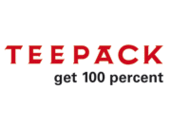Tea pack
| TEEPACK Spezialmaschinen GmbH & Co. KG
|
|
|---|---|
| legal form | GmbH & Co. KG |
| founding | 1948 |
| Seat | Meerbusch , North Rhine-Westphalia |
| Number of employees | 180 |
| Branch | mechanical engineering |
| Website | www.teepack.com |
The TEEPACK Spezialmaschinen GmbH & Co. KG was founded in 1948 in Meerbusch and specializes in the production of Teebeutelverpackungs- and bagging machines. The machines are in use in more than fifty countries. The company belongs to the Teekanne group. The inventor of the double-chamber teabag that is in use today is Adolf Rambold .
history
The history of TEEPACK is closely linked to the development of the Teekanne company into a leading company in the tea industry and the associated invention of the double chamber bag.
During the First World War, the R. Seelig & Hille teapot parent company in Dresden delivered the first forerunners of the infusion bags to soldiers under the name of tea bomb . They were made of cheesecloth and were made by hand in a fairly simple way. Although the gauze bags made the water slightly brown, they did not give off the fine aroma of the tea leaves.
They thought about a solution, spared no development costs and finally the Teekanne employee Adolf Rambold managed to find a better economical and tasty solution with the construction of a new machine and by using a different material. The new material was perforated, completely tasteless special parchment paper, which had the advantage that no flavor transfer to the tea could be determined. The new machine produced 75 tea bags per minute and was exported to all parts of the world. The transition from gauze bags to infusion bags made of perforated parchment paper also took place in many parts of the world, but the Americans pushed this development even further. They used a water-insoluble filter paper.
Adolf Rambold and TEEPACK Spezialmaschinen GmbH, which he founded in 1948, tried to produce an inexpensive tea bag in various tests with the different paper materials, with different types of tea, folding techniques and machines. In 1949 he presented the solution he had found in the form of the fully automatic tea bag packaging machine CONSTANTA. It produced 180 double-chamber tea bags per minute.
In the 1990s, market saturation became apparent in traditional areas of application and the company went through a crisis. In the meantime, additional applications have been developed and new sales markets have been opened in Russia and Asia.
Web links
Individual evidence
- ↑ A question of good taste . In: Welt am Sonntag , April 7, 2005, accessed on March 7, 2018
